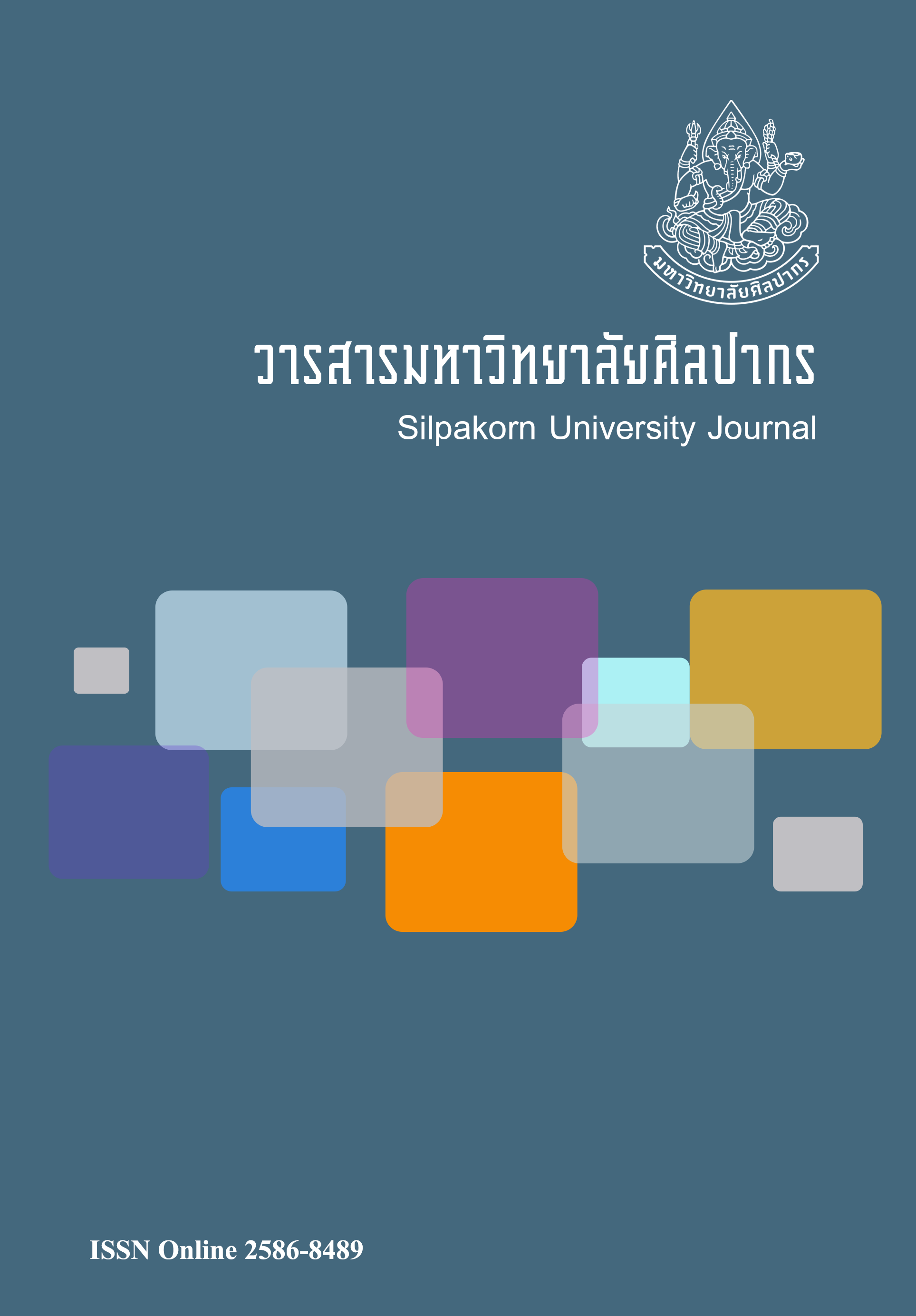ปัจจัยที่มีอิทธิพลต่อพฤติกรรมการเป็นสมาชิกที่ดีขององค์การ ของพนักงานบริษัทปิโตรเลียมแห่งหนึ่ง (Factors affecting organizational citizenship behaviors of employees in a Petroleum Company)
Main Article Content
Abstract
การวิจัยครั้งนี้มีวัตถุประสงค์เพื่อ 1) ศึกษาระดับของบุคลิกภาพห้าองค์ประกอบ การรับรู้ความยุติธรรมในองค์การ ความฉลาดทางอารมณ์ และพฤติกรรมการเป็นสมาชิกที่ดีขององค์การของพนักงานบริษัทปิโตรเลียมแห่งหนึ่ง และ 2) ศึกษาอิทธิพลของ บุคลิกภาพห้าองค์ประกอบ การรับรู้ความยุติธรรมในองค์การและ ความฉลาดทางอารมณ์ที่มีต่อพฤติกรรมการเป็นสมาชิกที่ดีขององค์การของพนักงานของบริษัทปิโตรเลียมแห่งหนึ่ง กลุ่มตัวอย่างที่ใช้ในการศึกษาคือ พนักงานบริษัทปิโตรเลียมแห่งหนึ่ง จำนวน 288 คน เก็บรวบรวมข้อมูลโดยใช้แบบสอบถาม สถิติที่ใช้ในการวิเคราะห์ข้อมูล ได้แก่ ค่าร้อยละ ค่าเฉลี่ย ส่วนเบี่ยงเบนมาตรฐาน และการวิเคราะห์การถดถอยพหุคูณแบบขั้นตอน
ผลการวิจัยพบว่า 1) พนักงานบริษัทปิโตรเลียมแห่งหนึ่งมีบุคลิกภาพแบบแสดงตัว บุคลิกภาพแบบเปิดรับประสบการณ์ บุคลิกภาพแบบประนีประนอม และบุคลิกภาพแบบมีจิตสำนึกอยู่ในระดับค่อนข้างสูง ส่วนบุคลิกภาพแบบหวั่นไหวอยู่ในระดับปานกลาง มีการรับรู้ความยุติธรรมในองค์การโดยรวมและรายด้านได้แก่ การรับรู้ความยุติธรรมในองค์การด้านผลลัพธ์ ด้านกระบวนการ และด้านปฏิสัมพันธ์อยู่ในระดับค่อนข้างสูง มีความฉลาดทางอารมณ์ด้านการตระหนักรู้ในตนเอง ด้านการจัดการอารมณ์ของตนเอง ด้านการจูงใจตนเอง ด้านการเข้าอกเข้าใจผู้อื่น และด้านทักษะทางสังคมอยู่ในระดับค่อนข้างสูง และมีพฤติกรรมการเป็นสมาชิกที่ดีขององค์การอยู่ในระดับค่อนข้างสูง 2) ความฉลาดทางอารมณ์ด้านการจูงใจตนเอง บุคลิกภาพแบบประนีประนอม ความฉลาดทางอารมณ์ด้านทักษะทางสังคม และการรับรู้ความยุติธรรมในองค์การด้านปฏิสัมพันธ์ สามารถร่วมกันพยากรณ์พฤติกรรมการเป็นสมาชิกที่ดีขององค์การของพนักงานบริษัทปิโตรเลียมแห่งหนึ่งได้อย่างมีนัยสำคัญทางสถิติที่ระดับ .001 โดยสามารถร่วมกันพยากรณ์ได้ร้อยละ 57.7
The objectives of this research were: 1) to study levels of the five-factor model of personality, organizational justice perception, emotional intelligence, and organizational citizenship behaviors of employees in a petroleum company and 2) to study the influences of personal factors, the five-factor model of personality, organizational justice perception, and emotional intelligence on organizational citizenship behaviors of employees in a petroleum company. The sample of this study were 288 employees in a petroleum company. Data were collected through questionnaires. The statistics used for data analysis were percentage, mean, standard deviation, and stepwise multiple regression analysis.
The results of this study found that 1) the employees in the petroleum company had a relatively high level of extrovert personality, openness to experience, agreeableness, and conscientiousness,
while personality of neuroticism was in moderate level. Employees had a relatively high level of overall organizational justice perception and, regarding each individual aspect, a relatively high level of resultative, procedural, and interactional organizational justice perception. Employees had a relatively high level of emotional intelligence, self-awareness, self-regulation, self-motivation, empathy, and social skill. In addition, employees had a relatively high level of organizational citizenship behavior. 2) Emotional intelligence in self-motivation, agreeableness personality, emotional intelligence in social skill, and interactional justice could jointly predict organizational citizenship behavior of employees in the petroleum company up to 57.7 percent at .001 statistical significance level.
Downloads
Article Details
References
Barrick, M. R. & Mount, M. K. (1991). The big five personality dimensions and job performance: a meta-analysis. Personnel Psychology, 1(44), 1-26.
Colquitt, J. A. et al. (2001). Justice at the millennium: a meta-analytic review
of 25 years of organizational justice research. Journal of Applied Psychology, 86(3), 425-435.
Cattell, R. B. (1965). The scientific analysis of personality. Baltimore: Penguin Books.
Chomcheowchan, A. (2009). The relationship between emotional quotient adversity quotient and organizational citizenship behavior of nurse: the case study in a governmental hospital (ความสัมพันธ์ระหว่างความฉลาดทางอารมณ์ ความสามารถในการเผชิญและฝ่าฟันอุปสรรค กับพฤติกรรมการเป็นสมาชิกที่ดีขององค์การของพยาบาล: กรณีศึกษาโรงพยาบาลรัฐแห่งหนึ่ง). Master’s dissertation, Thammasat University, Bangkok, Thailand.
Department of Mental Health. (2001). Research of the development of emotional intelligence for Thai people aged 12-16 years (รายงานการวิจัยการพัฒนาแบบประเมินความฉลาดทางอารมณ์สำหรับประชาชนไทยอายุ 12-16 ปี). Nonthaburi: Wongkamon Production.
Folger, R. & Cropanzano, R. (1998). Organizational justice and human resource management. Thousand Oaks, Calif: Sage.
Goleman, D. (1998). Working with emotional intelligence. New York: Bantam Books.
Greenberg, J. & Baron, R. A. (2000). Behavior in organizations (7th ed.). New Jersey: Prentice-Hall, Inc.
Howard, P. J. & Howard, J. M. (1995). The big five quick start: an introduction to the five factor model of personality for human resource professionals [Online]. Retrieved March 13, 2015 from www.eric.ed.gov
Junyam, K. (2013). Industrial and organizational psychology (จิตวิทยาอุตสาหกรรมและองค์การ). Bangkok: Odean Store Publishing.
Kijpreedaborisut, B. (2000). Statistics for research (สถิติเพื่อการวิจัย) (2nd ed.). Bangkok: Ruankaew Kanpim Publishing.
Kumar, K. (2009). Linking the ‘Big Five’ personality domains to organizational citizenship behavior. International Journal of Psychological Studies, 1(2), 73-81.
Kunja, K. (2007). Factors affecting organizational citizenship behaviors of employees of technology management center, national science and technology development agency (ปัจจัยที่มีอิทธิพลต่อพฤติกรรมการเป็นสมาชิกที่ดีขององค์การของพนักงานศูนย์บริหารจัดการเทคโนโลยี สำนักงานพัฒนาวิทยาศาสตร์และเทคโนโลยีแห่งชาติ). Master’s dissertation, Kasetsart University, Bangkok, Thailand.
Office of the Civil Service Commission. (2006). Investing in people (การลงทุนในคน) [Online]. Retrieved May 14, 2015 from www.ocsc.go.th/ocsc/th/index.php?option=com_content&view=article&id=2800:investing-in-people-&catid=461:2011-07-25-08-32-12&Itemid=307
Organ, D. W. & Bateman, T. S. (1991). Organizational behavior (4th ed.). Homewood, II: Irwin, Inc.
Prasitratthasin, S. (2003). Research methods in social sciences (ระเบียบวิจัยทางสังคมศาสตร์) (7th ed.). Bangkok: Fuangfah Publishing.
Puntinamai, W. (2008). Emotional Quotient (EQ): index of happiness and successful life (เชาวน์อารมณ์ (EQ): ดัชนีวัดความสุขและความสำเร็จของชีวิต) (7th ed.). Bangkok: Expernet Publishing.
Robbins, S. P. & Judge, T. A. (2011). Organizational behavior (14th ed.). New Jersey: Prentice-Hall.
Smithikrai, C. (2011). Industrial and organizational psychology (จิตวิทยาอุตสาหกรรมและองค์การ). Bangkok: Chulalongkorn University Publishing.


